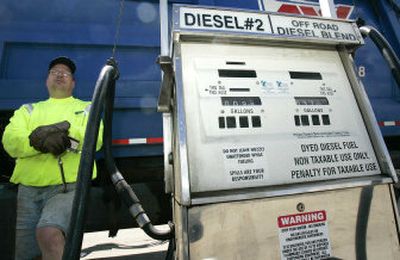Fuel bank members get gas for under a buck a gallon

ST. CLOUD, Minn. – This Memorial Day weekend, while some motorists are curtailing vacations because of high gas prices, Christine Blount is gleefully mapping out all the places she’ll go in her 1989 Bronco II.
The grocery store. Friends’ homes for coffee. Maybe Minneapolis, nearly 70 miles, to see a movie or shop – despite the fact that her vehicle gets 12 miles to the gallon.
But Blount is paying only 89 cents a gallon for gas. It costs her $20 to fill the tank.
Blount is one of 9,600 members of First Fuel Banks, a family-run business here where customers have been prebuying gasoline in bulk on the commodities market for more than two decades. Billed as the only company of its kind in the U.S., members use a debit card to pump gas at First Fuel’s six filling stations in the St. Cloud area and nearby in Monticello, Minn.
Nearly 300 of its customers pay less than $1 a gallon. Several thousand who bought into the system in the past few years are paying less than $2.
“All my friends thought I was crazy when I spent $500 on fuel back in 1999,” said Blount, a retired computer-store owner. “Now they’re calling me all the time, asking how they can get in on it.”
She calls this her “insane cheap” gas, and taps into the reserve only when she has to take a particularly long trip. Otherwise, she uses a secondary account she’s established that has hundreds of additional gallons, reserved at less than $2 a gallon.
“Whenever I have a couple hundred bucks free, I just add more gas to the account,” Blount said. “That way, I always have more than enough to keep me going. I’m never going to pay the prices you’re seeing these days.”
While gasoline prices have fallen slightly from recent record highs, they remain far above last year’s levels. On Friday, the national average for self-serve regular was $2.86. A year ago, drivers were paying at least 75 cents less per gallon.
The idea of having consumers gamble on fuel futures as a way to cut costs is catching on.
Gulf Oil LP, for example, plans to roll out a system to let consumers buy prepaid gas cards at set prices. The Massachusetts-based company has the franchised rights to more than 1,800 Gulf stations in the Northeast.
The idea for First Fuel came from Denis Feneis, who in 1963 began delivering heating fuel to families across this bustling town of more than 64,000 on the west bank of the Mississippi River. A few years later, trying to draw more sales, he set up a small two-pump gas station.
“We were a family business, so you did what you could to help out your friends and neighbors,” said Dan J. Feneis, the company’s co-founder and Denis’ son. “That meant letting people owe you for the fuel if they couldn’t afford it, which meant our business would be tight on paying the bills too. Dad would always say, ‘I wish there was a way that we could convince people to pay for all the fuel they’d need up front. That way maybe we could figure out a way to make it cheaper for folks.’ “
In 1982, Dan and his brother, Jim, expanded the family gas station. They also installed a computer system to monitor how much gasoline was in each storage tank and how much a particular customer had pumped. Then the brothers began promoting the idea of a prepaid gas club.
Customers pay $1 to join First Fuel and can lock in a price for future purchases.
The bank has accepted deposits for as little as $3 worth of gasoline, and as much as $400,000. The company can cover small advance purchases from the fuel it stores. For bigger deposits, it purchases fuel futures contracts on the New York Mercantile Exchange.
How much a customer pays is based on what the market price for fuel is on the day they buy in. They also pay fees to First Fuel to cover the entire cost of transporting the fuel to Minnesota and any additional taxes. The bank also gets a fee for brokering the sale, and makes money off its regular retail customers as well.
“We provide the fuel for St. Cloud’s Police Department, the Parks and Recreation Department and several other city agencies,” said Jim Feneis, the company’s chief executive officer. “We also have dozens of retirees who only drive a couple hundred miles a year, going to and from the grocery store.”
Ever since last summer’s Gulf Coast hurricanes, business has been booming at First Fuel Banks.
“I had one woman come in here right after Hurricane Katrina with a $10,000 check, and insist that she had to buy gas,” said Sara Blaszak, a customer service worker.
“I kept asking her, ‘Are you sure? It’s $3.27 a gallon. It’s going to drop some.’ But she wouldn’t budge. We’re expecting the same thing to happen this summer, when the hurricanes hit again.”